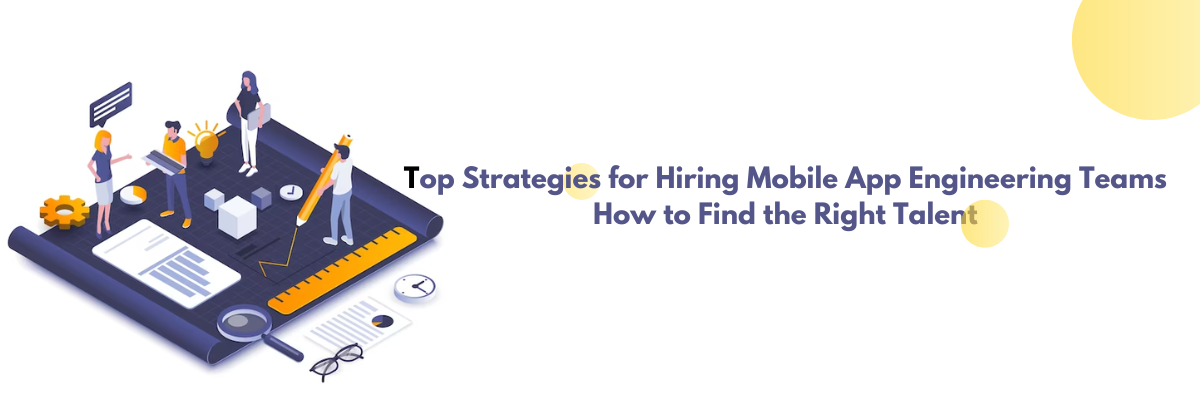Top Strategies for Hiring Mobile App Engineering Teams: How to Find the Right Talent
Hiring mobile app engineering teams has become increasingly important in today’s fast-paced digital landscape. With the mobile app market continuing to grow at an exponential rate, the demand for skilled engineers has never been higher.
In fact, according to recent research, the number of mobile app downloads is projected to reach 258.2 billion by 2022, up from 178.1 billion in 2017.
As a result, the competition for top mobile app engineering talent has become fierce. Companies need to have a clear strategy in place to attract and retain skilled engineers who can create innovative and user-friendly mobile apps that meet the needs of today’s consumers.
Building a successful mobile app engineering team requires a comprehensive approach that goes beyond technical skills and experience. Companies must have technical requirements but also prioritize diversity and inclusion, workplace culture, and ongoing development opportunities to create a team that is equipped to meet the challenges of the fast-evolving mobile app industry.
In this blog, we will dive into the key strategies for hiring mobile app engineering teams, common mistakes to avoid, and how to create a workplace culture that fosters creativity, collaboration, and innovation.
Whether you are a startup or an established company, the tips and insights we share will help you attract and retain top talent and drive success in the mobile app industry. So let’s get started!
Table of Contents
- Key Skills and Expertise Required for Mobile App Engineering Teams
- Benefits and Drawbacks of Hiring In-House Mobile App Engineers
- Tips for Hiring Mobile App Engineering Teams
- Role of Diversity and Inclusion in Building a Successful Mobile App Engineering Team
- Strategies for Attracting Top Talent When Hiring Mobile App Engineering Teams
- Common Mistakes to Avoid When Hiring Mobile App Engineering Teams
- Wrapping Up
- Frequently Asked Questions
Key Skills and Expertise Required for Mobile App Engineering Teams
Mobile app engineering is a complex field that requires a diverse range of skills and expertise. Developing a mobile app requires a team of professionals who can work together to create a product that meets the needs of users.
Here are some key skills and expertise required for mobile app engineering teams:
1. Programming languages
Mobile app engineers need to be proficient in programming languages such as Java, Swift, Objective-C, Kotlin, and JavaScript. These languages are used to build the front-end and back-end of the app.
2. User interface design
User interface design is a crucial aspect of mobile app development. Engineers must have the ability to design visually appealing and intuitive user interfaces that are easy to use.
3. Cross-functional collaboration
Mobile app engineering teams are usually comprised of professionals from different backgrounds, including designers, developers, and project managers. Effective collaboration and communication are crucial to ensure the success of the entire project itself.
4. Mobile platform knowledge
Mobile app engineers must have a deep understanding of the various mobile application platforms they are developing, operating systems such as iOS, Android, and Windows. This includes knowledge of the platform’s features, design guidelines, and programming languages.
5. Security
Mobile app security is a critical consideration, and engineers must have a solid understanding of security best practices to ensure that user data is protected.
6. Agile development methodology
Agile development methodology emphasizes iterative development and collaboration, and it is a common approach used in mobile app development companies. Engineers must be familiar with agile practices and be able to work effectively in an agile team.
7. Performance optimization
Mobile app performance is critical to the user experience, and engineers must have the ability to optimize the app’s performance to ensure that it runs smoothly and efficiently.
8. Quality assurance
Quality assurance is a critical aspect of mobile app development. Engineers must have the ability to test the app thoroughly to identify and fix bugs before release.
9. Analytics
Mobile app analytics provides insights into user behavior and can help engineers make data-driven decisions. Engineers must have the ability to collect and analyze data to improve the app’s user experience.
Benefits of Hiring In-House Mobile App Engineers:
Hiring in-house mobile app engineers can be a significant investment for any company. While it can have its advantages, there are also some potential drawbacks to consider. Here are some benefits and drawbacks of hiring in-house mobile app engineers:
1. Dedicated team
When a company hires in-house mobile app engineers, they have a dedicated team that works exclusively on their mobile app projects. This ensures that the dedicated development team is aligned with the company’s goals and has a deep understanding of the business.
2. Collaboration
In-house mobile app engineers can work closely with other teams in the company, such as design, marketing, and product development. This fosters collaboration and helps ensure that the app aligns with the company’s overall vision.
3. Control
Companies have more control over the app development process when they have an in-house team. They can prioritize tasks, manage resources, and make changes as needed to ensure that the app meets their specific needs.
4. Loyalty
In-house mobile app developers are typically more loyal to the company, which can lead to better long-term relationships and reduced turnover rates.
Drawbacks of Hiring In-House Mobile App Engineers:
1. Costs
Hiring and maintaining an in-house team of freelance app developers and engineers can be expensive. Companies need to provide salaries, benefits, and office space, which can add up quickly.
2. Expertise
In-house teams may not have the expertise required to develop complex or specialized mobile apps. In some cases, it may be more cost-effective to hire a third-party software development company that specializes in mobile app development.
3. Limited resources
In-house teams have limited resources, which can lead to delays or missed deadlines. If a company needs to scale up quickly, it may be challenging to hire new engineers on short notice.
4. Competing priorities
In-house teams may have competing priorities, such as working on multiple projects simultaneously or supporting other teams within the company. This can lead to delays or decreased quality of work.
Tips for Hiring Mobile App Engineering Teams
Hiring mobile app engineering teams can be a daunting task, especially if you don’t have experience in the field. Here are some tips to help you hire the best mobile app engineering team for your project:
1. Define Your Project Goals and Requirements
Before you start the hiring process, it’s essential to define your project goals and requirements. This will help you identify the specific skills and expertise required for the job.
2. Look for Experience
When hiring mobile app engineering teams, look for professionals with a proven track record of success. Check their portfolio and past projects to see if they have experience working on projects similar to yours.
3. Consider Culture Fit
Hiring a team with the right culture fit is essential to ensure smooth collaboration. Look for candidates who share your company’s values and have a similar work ethic.
4. Check for Communication Skills
Communication is essential in any team-based project, and mobile app development is no exception. Look for candidates who have strong communication skills, can explain technical concepts in plain language, and can collaborate effectively with others.
5. Evaluate Technical Skills
Technical skills are critical in mobile app development. Ensure that candidates have the necessary technical skills, such as proficiency in programming languages, app development frameworks, and user interface design.
6. Ask for References
Ask candidates for references from past clients or employers. This can help you gain insight into their work ethic, communication skills, and overall performance.
7. Look for Versatility
Mobile app development is a constantly evolving field, and it’s important to hire a team that can adapt to changes and new technologies. Look for candidates who are versatile and willing to learn new skills.
8. Consider Outsourcing
If you don’t have the resources to hire an in-house mobile app engineering team, consider outsourcing the project to a third-party development agency. This can provide access to a broader range of development skills, and expertise without the added costs of maintaining an in-house dedicated app development team.
Role of Diversity and Inclusion in Building a Successful Mobile App Engineering Team

Diversity and inclusion play a crucial role in building a successful mobile app engineering team. Here are some reasons why:
1. Creativity and Innovation
A diverse team brings together different perspectives, experiences, and backgrounds, leading to a more creative and innovative approach to problem-solving. A team that is open to different ideas and perspectives is more likely to come up with unique solutions that can help differentiate your app from competitors.
2. Improved User Experience
A diverse team is better equipped to understand and cater an app idea to the needs of a diverse user base. Mobile apps that are designed and developed by a team that includes diverse perspectives are more likely to provide a better user experience for all users, including those from underrepresented communities.
3. Increased Talent Pool
When a company prioritizes diversity and inclusion, it can attract a wider range of talent. By creating an inclusive work environment, companies can appeal to candidates who value diversity and are seeking an inclusive workplace culture.
4. Enhanced Company Reputation
Building a diverse mobile app engineering team can improve a company’s reputation and demonstrate its commitment to social responsibility. This can lead to positive media coverage, increased customer loyalty, and a better company image.
5. Increased Employee Retention
An inclusive work environment fosters a sense of belonging and can lead to increased employee retention. Employees who feel valued, respected, and included are more likely to stay with a company and contribute to its success over the long term.
Strategies for Attracting Top Talent When Hiring Mobile App Engineering Teams
Attracting top talent to your mobile app engineering team can be challenging, especially when competing with other companies in a highly competitive market.
Here are some strategies that can help you attract and retain top talent for your mobile app engineering team:
1. Develop a Strong Employer Brand
A strong employer brand can help you stand out from your competitors and attract top talent. Highlight your company’s culture, values, and mission, and showcase your company’s achievements, awards, and positive employee experiences.
2. Offer Competitive Compensation and Benefits
Offering competitive compensation and benefits packages can help you attract and retain top talent. Research industry benchmarks for salaries and benefits, and offer packages that are competitive and align with the skills and experience of the candidates you are seeking.
3. Provide Opportunities for Growth and Development
Top talent is often looking for opportunities for growth and development. Provide access to training, mentorship, and career development opportunities to help employees grow their skills and advance their careers.
4. Emphasize Work-Life Balance
Work-life balance is an important consideration for many candidates. Offering flexible schedules, remote work options, and other work-life balance initiatives can help attract top talent who value a healthy work-life balance.
5. Foster an Inclusive and Diverse Work Environment
Creating an inclusive and diverse work environment can help attract top talent who value diversity and inclusivity. Ensure that your hiring process is free from bias, and actively seek out candidates from underrepresented communities to help foster a more diverse and inclusive workplace.
6. Provide Challenging and Engaging Work
Top talent is often seeking challenging and engaging work that allows them to use their skills and make a meaningful impact. Provide opportunities for challenging work and ensure that employees are engaged in projects that align with their interests and passions.
7. Create a Positive Workplace Culture
Workplace culture is an important consideration for many candidates. Ensure that your workplace culture is positive and supportive and that employees feel valued, respected, and appreciated.
Common Mistakes to Avoid When Hiring Mobile App Engineering Teams
Hiring a mobile app engineer is a crucial task that requires careful planning and execution. Here are some common mistakes to avoid when hiring mobile app engineering teams:
1. Failing to Define Job Requirements
One common mistake is failing to define clear job requirements for the role. This can lead to a lack of clarity in the hiring process and can result in candidates who are not a good fit for the role.
2. Focusing Too Much on Technical Skills
While technical skills are important, it’s important to consider other factors such as cultural fit, communication skills, and problem-solving abilities. Hiring solely based on technical skills can result in a team that lacks diversity and may not be able to work collaboratively.
3. Relying Too Heavily on Resumes
Resumes can be a valuable tool for screening candidates, but they don’t tell the whole story. It’s important to conduct thorough interviews and assessments to evaluate a candidate’s skills and fit for the role.
4. Ignoring Soft Skills
Soft skills such as communication, teamwork, and adaptability are critical for success in a mobile app engineering team. Ignoring these skills can result in a team that lacks cohesion and may struggle to work effectively.
5. Rushing the Hiring Process
Rushing the hiring process can result in poor hiring decisions and a team that lacks cohesion. Take the time to carefully evaluate candidates and ensure that they are a good fit for the role and the team.
6. Overlooking Diversity and Inclusion
A lack of diversity and inclusion can lead to a team that lacks creativity and innovation. It’s important to actively seek out candidates from underrepresented communities and create an inclusive hiring process.
7. Failing to Sell the Company
Candidates want to work for companies that align with their values and offer opportunities for growth and development. Failing to sell the company and its culture can result in a lack of interest from top candidates.
Wrapping Up
As the mobile app industry continues to grow and evolve, building a successful engineering team has become more important than ever. It’s not just about finding the right technical skills or experience, but also creating a workplace culture that fosters creativity, innovation, and collaboration.
To attract top talent, companies must differentiate themselves by highlighting their unique values and mission, offering competitive compensation packages, and creating opportunities for growth and development. Additionally, companies must prioritize diversity and inclusion to ensure they are creating a team that reflects the needs and perspectives of their users.
However, building a successful mobile app engineering team is not just about ticking boxes and following a formula. It requires a creative approach that inspires passion, fosters curiosity, and cultivates a sense of purpose.
By creating a dynamic workplace culture that encourages experimentation, collaboration, and personal growth, companies can attract and retain top talent and drive innovation in the mobile app industry.
Frequently Asked Questions
How much does it cost to hire an app development team?
The cost of hiring an app development team can vary widely depending on several factors such as the team size, location, experience level, and project scope. However, on average, the development cost of hiring a basic, app development project team can cost anywhere from $50,000 to $250,000, while larger or more complex projects can cost upwards of $500,000 or more.
How do I hire an app development team?
To hire an app development team, determine your project needs, budget, and timeline, and then search for experienced developers with a strong portfolio and relevant skills. Evaluate candidates through interviews, coding tests, and reference checks, and consider factors such as communication skills, cultural fit, and teamwork ability.
How do I hire a dedicated mobile app developer?
Consider using freelance marketplaces or working with an outsourcing agency to find candidates, and evaluate them through interviews, coding tests, and reference checks. Consider factors such as communication skills, cultural fit, and teamwork ability.
How to hire the best mobile app development company?
To hire the best mobile app development company, do thorough research and evaluate their portfolio, client testimonials, and experience level. Ask for references and case studies to assess their expertise and ability to deliver projects on time and within budget. Consider factors such as communication skills, cultural fit, and customer service.
What skills should I look for when hiring a mobile app developer?
Look for developers with strong skills in programming languages such as Java, Swift, or Kotlin, as well as experience with popular mobile app development frameworks and technologies like React Native or Flutter.
How important is experience when hiring a mobile app development team?
Experience is important, but it’s not the only factor to consider. Look for developers with a strong portfolio, relevant skills, and a willingness to learn and adapt to new technologies.
Should I hire a mobile app development team or a freelancer?
It depends on your own project development needs and budget. Freelancers can be more affordable and flexible, while a development team may offer more specialized expertise and project management support.
How do I evaluate a mobile app developer’s technical skills?
Consider using coding tests, reviewing their portfolio and GitHub profile, and asking them to explain how they would approach a specific development challenge.
How do I ensure my mobile app development team is communicating effectively?
Set clear communication expectations and use tools like Slack or Trello to keep everyone on the same page. Regular check-ins and status updates can also help ensure everyone is on track.














